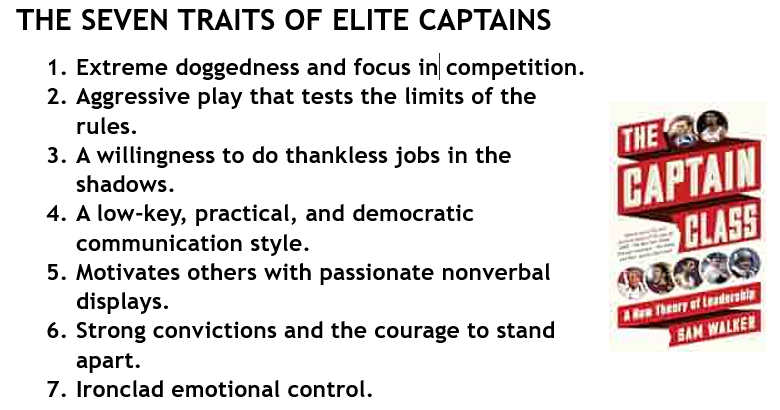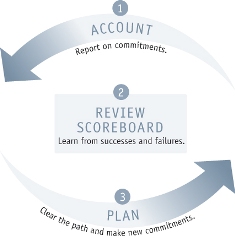In a recent Scaling Up newsletter, Verne Harnish recommended The Captain Class: The Hidden Force That Creates the World's Greatest Teams by Sam Walker. While it’s primarily a sports book, discovering why the best teams became the best provides insights to consider in the makeup of your teams, and what type of person to consider leading them.
THE SEVEN TRAITS OF ELITE CAPTAINS
Author Sam Walker uses Tom Cruise’s role in Top Gun Maverick as an example. He prefers remaining a Captain (his title in the movie); he challenges top command, and they listen; he doesn’t ask his teammates to do more than he would do (demonstrates the mission can be accomplished in the 2.5 minutes); willing to bend/break the rules; etc.
Part 2 of the book is fun to read, especially if you like sports. Here are the 7 traits of elite captains according to Walker:
- Extreme doggedness and focus in competition.
- Aggressive play that tests the limits of the rules.
- A willingness to do thankless jobs in the shadows.
- A low-key, practical, and democratic communication style.
- Motivates others with passionate nonverbal displays.
- Strong convictions and the courage to stand apart.
- Ironclad emotional control.
 This scene in Top Gun: Maverick (2022) - Maverick's Test Run Scene demonstrates several of these 7 traits
This scene in Top Gun: Maverick (2022) - Maverick's Test Run Scene demonstrates several of these 7 traits
If you’re a sports fan you may have arguments about the top 13 teams he selected. He had high standards and criteria. He dedicates the first part of the book to his selection process and rules. The standard is so rigid, that two teams I thought would be on the list, Michael Jordan’s Chicago Bulls, and Vince Lombardi’s early 1960s Green Bay Packers, are limited to tier two.
What can YOU gain from the insights in the book?
Surprising Results of Group Efforts
 French agricultural engineer Maximilien Ringelmann was one of the first scientists to explore the dynamics of group effort. In 1913, Ringelmann asked his students to pull on a rope, both individually and in groups, while he measured the force they exerted.
French agricultural engineer Maximilien Ringelmann was one of the first scientists to explore the dynamics of group effort. In 1913, Ringelmann asked his students to pull on a rope, both individually and in groups, while he measured the force they exerted.
The conventional view was that people in a group would have more power collectively than they did alone—in other words, adding people to the pulling group would have a multiplying effect on the force.
But the results showed something surprising. While the force applied did grow with every new person added, the average force applied by each person fell. Rather than amplifying the power of individuals, the act of pulling as a team caused each person to pull less hard than when pulling alone. Later researchers coined a name for this phenomenon. They called it social loafing.
Social Loafing
 In 1979, a group of scientists at Ohio State University set out to replicate it by asking test subjects to shout as loud as they could and recorded the decibel levels they produced. Next, the subjects were put in groups and asked to repeat the shouting.
In 1979, a group of scientists at Ohio State University set out to replicate it by asking test subjects to shout as loud as they could and recorded the decibel levels they produced. Next, the subjects were put in groups and asked to repeat the shouting.
The results confirmed Ringelmann’s: Each person’s group shouts were up to 20 percent less loud than their individual ones. Researchers tried variations of Ringelmann’s rope test and got the same results. It was a fact of human nature. The less identifiable one person’s effort is, the less effort they put in.
Here’s the valuable insight.
Fordham University looked at whether social loafing could be overcome. They wanted to see whether one person giving maximum effort could inspire others to improve their performances. The scientists grouped their shouters in pairs and, before they began shouting, told them that their partner was a high-effort performer. these situations, something interesting happened. The pairs screamed just as hard together as they had alone. Knowing a teammate was giving it their all was enough to prompt people to give more themselves. This experiment demonstrated that high effort, or just the perception of high effort, is transferable.
Overcome the Ringelmann Effect
The Ringelmann effect can be counteracted. The antidote is knowing someone else in the group is leaving nothing in reserve.
The Fordham study seemed to confirm author Sam Walker’s suspicions about Tier One captains: Their displays of tenacity positively influenced how their teams performed.
Business Efforts in Groups?
My research suggests Psychology looks for other solutions to prevent social loafing. Walker suggests it can be eliminated by an inspired team leader.
 Look at your business. Do some teams or groups perform better than others? Have you ever been on a team that performed superior to others? I have. The “Captain” idea isn’t so much replicated in name in business, yet teams or groups usually have a determined or implied member who leads. Without this person success is inconsistent. Identifying, recognizing, and rewarding “captainship” in your business team’s efforts, can go a long way to increasing your business performance.
Look at your business. Do some teams or groups perform better than others? Have you ever been on a team that performed superior to others? I have. The “Captain” idea isn’t so much replicated in name in business, yet teams or groups usually have a determined or implied member who leads. Without this person success is inconsistent. Identifying, recognizing, and rewarding “captainship” in your business team’s efforts, can go a long way to increasing your business performance.
To create an environment where everyone is inspired to give their best, contact Positioning Systems to schedule a free exploratory meeting.
Let’s help you to turn your business into a growth organization!
Growth demands Strategic Discipline.
 Would you like to know how to build your business to achieve differentiation and guarantee your success? Next blog, authors Jeff Henderson and John C. Maxwell, Know What You’re FOR: A Growth Strategy for Work, An Even Better Strategy for Life provides two questions every business needs to answer.
Would you like to know how to build your business to achieve differentiation and guarantee your success? Next blog, authors Jeff Henderson and John C. Maxwell, Know What You’re FOR: A Growth Strategy for Work, An Even Better Strategy for Life provides two questions every business needs to answer.
Building an enduring great organization requires disciplined people, disciplined thought, disciplined action, superior results, producing a distinctive impact on the world.
 Discipline sustains momentum, over a long period of time, laying the foundations for lasting endurance.
Discipline sustains momentum, over a long period of time, laying the foundations for lasting endurance.
A winning habit starts with 3 Strategic Disciplines: Priority, Metrics, and Meeting Rhythms. Forecasting, accountability, individual, and team performance improve dramatically.
Meeting Rhythms achieve a disciplined focus on performance metrics to drive growth.
Let Positioning Systems help your business achieve these outcomes on the Four most Important Decisions your business faces:
|
DECISION |
RESULT/OUTCOME |
|
PEOPLE |
|
|
STRATEGY |
|
|
EXECUTION |
|
|
CASH |
|
Positioning Systems helps mid-sized ($5M - $500M+) businesses Scale-UP. We align your business to focus on Your One Thing! Contact dwick@positioningsystems.com to Scale Up your business! Take our Four Decisions Needs Assessment to discover how your business measures against other Scaled Up companies. We’ll contact you.
NEXT BLOG – Know What You're FOR – Two Questions Every Business Needs to Answer






.jpeg?width=150&height=135&name=Hand%20with%20marker%20writing%20the%20question%20Whats%20Next_%20(1).jpeg)

